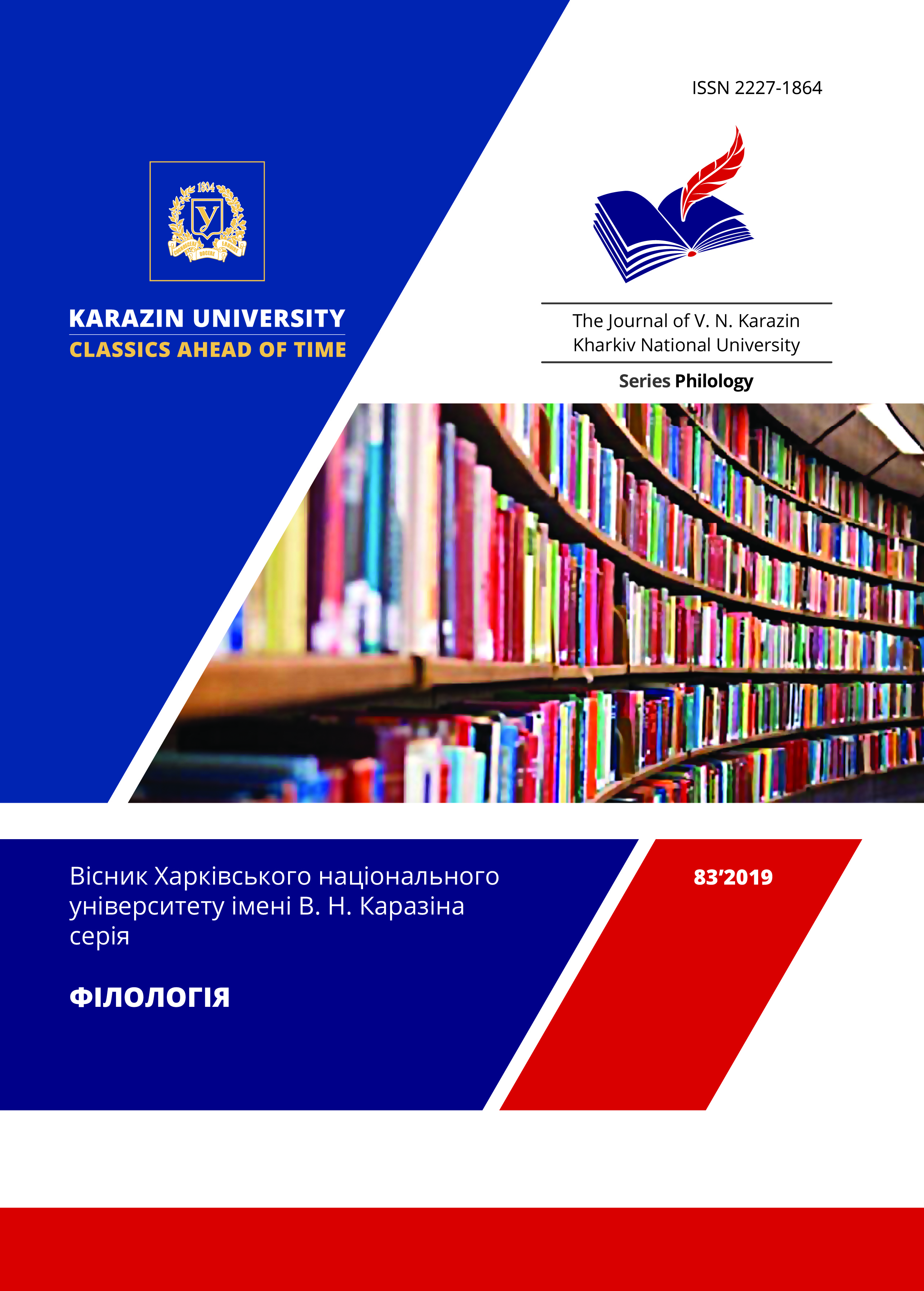Construction У кого есть кто/что as an ergative remnant of Russian grammar: cognitive evolutionary interpretation of semantics
Abstract
The article is devoted to the cognitive-evolutionary interpretation of the semantic features of the construction У кого есть кто/что. The conceptual basis of the cognitive-evolutionary school of linguistics is the recognition of the existence of the cognitive-evolutionary algorithm “perception → logical thinking → logical language”, where perception can be: 1) absolutely right-hemispheric and syncretic: holistic, not allowing to differentiate features and, therefore, to categorize cognoscible; 2) right-hemispheric to a great extent and superficial, focusing on the proximate, most noticeable, “plain to see” features, categorization by which is usually erroneous; 3) left-hemispheric or alternative, that is, focusing on all the features that are present in the perception zone, so that the feature necessary for correct categorization can be consciously selected from them. The article proves that the Russian construction У кого есть кто/что is an ergative remnant, characterized by two syncretic cases of the ergative system: ergative (and not genitive) and absolute (and not nominative). Therefore, neither the traditional formal nor the semantic-syntactic interpretation of this perception of the construction generated by syncretism can be recognized as absolutely correct. The traditional formal interpretation of this construction does not take into account that semantically who has is a quasi-subject (not object), and who / what is a quasi-object (not subject). The semantic-syntactic interpretation of this construction does not take into account that the subject semantically expressed in it by the form of indirect case is inactive and dependent; the object has the case form of the subject, and because of that the subject of the ergative construction is directly opposite to the subject of the nominative construction in terms of activity and independence. Thus, it is important to recognize the hopeless formality of translating this Russian possessive construction into other nominative languages with their own nominative constructions and the reverse translation.
It is considered didactically useful to note its inactively subjective ergative rudimentary nature and, as a consequence, the formality of the case forms of its actants, when presenting this construction in textbooks and grammar books.
Downloads
References
Abaev V. I. Parerga 2. YAzykoznanie opisatel'noe i ob"yasnitel'noe. O klassifikacii nauk // Voprosy yazykoznaniya. 1986. № 2. S. 27–39.
Alpatov V. M. Istoriya lingvisticheskih uchenij: Ucheb. posobie. 4-e izd., ispr. i dop. M.: YAzyki slavyanskoj kul'tury, 2005. 368 s.
Aristotel'. Vtoraya analitika // Aristotel'. Sochineniya v chetyrekh tomah. T. 2 / Pod red. Z. N. Mikeladze. M.: Izd-vo social'no-ekonomicheskoj literatury «Mysl'», 1978. S. 255–346.
Bichakdzhan B. Evolyuciya yazyka: demony, opasnosti i tshchatel'naya ocenka // Razumnoe povedenie i yazyk. Vyp. 1. Kommunikativnye sistemy zhivotnyh i yazyk cheloveka. Problema proiskhozhdeniya yazyka / Sost. A. D. Koshelev, T. V. CHernigovskaya. M.: YAzyki slavyanskih kul'tur, 2008. S. 41-58.
Vezhbickaya A. YAzyk. Kul'tura. Poznanie / Per. s angl.; otv. red. M. A. Krongauz; vstup. st. E. V. Paduchevoj. M.: Russkie slovari, 1996. 416 s.
Gvozdev A. N. Ocherki po stilistike russkogo yazyka. M.: Izd-vo Akademii pedagogicheskih nauk RSFSR, 1952. 336 s.
Zolotova G. A. Ocherk funkcional'nogo sintaksisa russkogo yazyka. M.: Nauka, 1973. 351 s.
Zolotova G. A. Sintaksicheskij slovar': Repertuar elementarnyh edinic russkogo sintaksisa. Izd. 3-e, stereotipnoe. M.: Editorial URSS, 2006. 440 s.
Kibrik A. E. Ocherki po obshchim i prikladnym voprosam yazykoznaniya (universal'noe, tipovoe i specifichnoe v yazyke). M.: Izd-vo MGU, 1992. 336 s.
Klimov A. G. Ocherk obshchej teorii ergativnosti. M.: Nauka, 1973. 264 s.
Klimov A. G. Principy kontensivnoj tipologii. M.: Nauka, 1983. 224 s.
Meshchaninov I. I. Novoe uchenie o yazyke. Stadial'naya tipologiya. M.: Socekgiz, 1936. 344 s.
Meshchaninov I. I. Obshchee yazykoznanie. K probleme stadial'nosti v razvitii slova i predlozheniya. L.: Uchpedgiz, LO, 1940. 260 s.
Meshchaninov I. I. Ergativnaya konstrukciya v yazykah razlichnyh tipov. L.: Nauka, LO, 1967. 248 s.
Petrov A. V. Semantika bezlichnosti // Filologicheskie nauki. 2009. № 1. S. 57-64.
Popov S. L. Kognitivnye osnovaniya evolyucii form russkogo sintaksicheskogo soglasovaniya: Monografiya. Har'kov: NTMT 2013. 150 s.
Radbil' T. B. Osnovy izucheniya yazykovogo mentaliteta: ucheb. posobie. M.: Flinta: Nauka, 2010. 328 s.
Skoblikova E. S. Sovremennyj russkij yazyk. Sintaksis prostogo predlozheniya: uchebnoe posobie. M.: Prosveshchenie, 1979. 236 s.
Sovremennyj russkij yazyk: V 3-h ch. CH. 3.: Sintaksis. Punktuaciya: Uchebnoe posobie. M.: Prosveshchenie, 1981. 271 s.: il.
Shelyakin M. A. Funkcional'naya grammatika russkogo yazyka. M.: Russkij yazyk, 2001. 288 s.
Epshtejn M. N. O tvorcheskom potenciale russkogo yazyka. Grammatika perekhodnosti i tranzitivnoe obshchestvo // Znamya. 2007. № 3. URL: http://magazines.russ.ru/ znamia/ 2007/3/ep18.html (data obrashheniya: 17.07.2019.)




